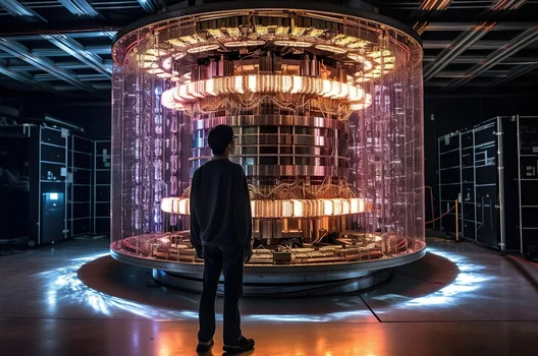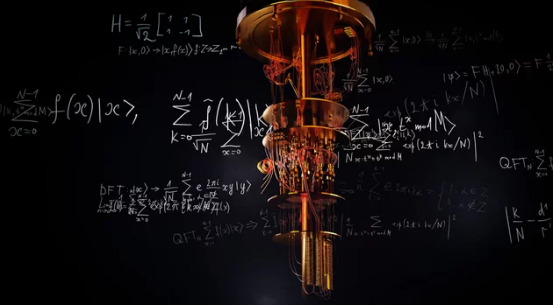Quantum Machine Learning
Quantum Machine Learning (QML) represents the intersection of two groundbreaking fields in modern technology: quantum computing and machine learning. This convergence promises to revolutionize our approach to data analysis, problem-solving, and artificial intelligence.
The Quantum Leap: Exploring the Intersection of Quantum Computing and Machine Learning
While each field has made significant strides independently, their convergence has unlocked unprecedented opportunities, birthing a new era of exploration and discovery. There's an intricate relationship between quantum computing and machine learning, exploring the synergies, challenges, and the transformative potential they hold when unified.

Quantum Computing: Unlocking the Unthinkable
Before diving deeper into the fusion of quantum computing and machine learning, it's imperative to grasp the fundamental principles of quantum computing.
Unlike classical computers, which operate using bits as the basic unit of information (either 0 or 1), quantum computers leverage quantum bits or qubits. These qubits, owing to the principles of superposition and entanglement, can exist in multiple states simultaneously, exponentially increasing computational power.
Quantum computing's prowess lies in its ability to tackle complex problems that surpass the capabilities of classical computers. Tasks like factorization, optimization, and simulation, which are arduous for conventional systems, are poised to be revolutionized by quantum computing. The promise of exponentially faster computations opens doors to transformative advancements across various domains, including machine learning.
Machine Learning with Quantum Computers: Pioneering a New Frontier
Machine learning, a subset of artificial intelligence, empowers computers to learn from data and make decisions or predictions without explicit programming. Traditional machine learning algorithms, while powerful, are bound by the constraints of classical computing. Enter quantum computing – a disruptive force poised to propel machine learning into uncharted territories.
One of the most compelling applications of quantum computing in machine learning is the development of quantum machine learning algorithms. These algorithms harness the innate capabilities of quantum computers to process and analyze vast datasets at unparalleled speeds. By leveraging quantum parallelism and interference, quantum machine learning algorithms promise to unravel intricate patterns within data, offering insights that were previously elusive.Quantum deep learning emerges as a subset of quantum machine learning, where deep neural networks are enhanced by quantum computing principles. Deep learning, a subfield of machine learning, has demonstrated remarkable success in various tasks such as image recognition, natural language processing, and reinforcement learning. However, the computational demands of training deep neural networks often pose significant challenges. Quantum computing's ability to handle exponential calculations in parallel presents a compelling solution to expedite the training process and overcome computational bottlenecks.
Potential economic value from quantum computing is estimated to be between $620B-$1,270B across 4 industries by 2035: chemicals, life sciences, finance, and automotive
Foundations of Quantum Computing in Machine Learning
Quantum computing leverages the principles of quantum mechanics, particularly superposition and entanglement, to perform computations that are infeasible for classical computers. In the context of machine learning:
These quantum properties can be harnessed to enhance various aspects of machine learning, from data preprocessing to model training and optimization.
Quantum Machine Learning Algorithms
QML algorithms are designed to take advantage of quantum computing's unique capabilities:
Advantages of Quantum Machine Learning
QML offers several potential advantages over classical machine learning:
Roadblocks in Quantum Machine Learning
Despite its promise, QML faces several significant challenges:

Near-Term Applications and NISQ Era
In the current Noisy Intermediate-Scale Quantum (NISQ) era, researchers are focusing on:
Future Directions and Long-Term Potential
As quantum hardware improves, the potential of QML expands:
Interdisciplinary Nature of QML
QML requires expertise from multiple fields:
Ethical and Societal Implications
The development of QML raises important questions:
Deep Learning and Quantum Computing: Synergies Unveiled
The intersection of deep learning and quantum computing heralds a new era of innovation, where the limitations of classical computing become relics of the past. Quantum deep learning algorithms, empowered by quantum computers, exhibit unprecedented capabilities in data processing, pattern recognition, and decision-making.
One of the primary advantages of quantum deep learning lies in its ability to handle exponentially large feature spaces. Traditional deep learning models often encounter computational constraints when dealing with high-dimensional data. Quantum computing's parallelism enables efficient exploration of these expansive feature spaces, facilitating more comprehensive analysis and enhanced model performance.

Quantum computing's parallelism enables efficient exploration of these expansive feature spaces, facilitating more comprehensive analysis and enhanced model performance.
Quantum deep learning holds the promise of unlocking new avenues in generative modeling and unsupervised learning.
Generative adversarial networks (GANs), a popular framework in deep learning for generating synthetic data, stand to benefit from the computational prowess of quantum computers. By harnessing quantum resources, GANs can generate more realistic and diverse samples, pushing the boundaries of creativity and innovation.
Challenges and Opportunities Ahead
While the fusion of quantum computing and machine learning opens doors to unprecedented possibilities, significant challenges lie ahead. Foremost among these challenges is the realization of fault-tolerant quantum hardware capable of sustaining delicate quantum states over extended periods.

Current quantum systems are prone to errors caused by decoherence and environmental noise, posing obstacles to the reliable execution of quantum algorithms.
The development of quantum machine learning algorithms requires interdisciplinary collaboration between quantum physicists, computer scientists, and domain experts.
Bridging the gap between quantum theory and machine learning practices necessitates concerted efforts to develop intuitive algorithms that harness the full potential of quantum computing while addressing real-world challenges. Despite these challenges, the opportunities presented by quantum computing in the realm of machine learning are immense. From drug discovery and materials science to financial modeling and optimization, quantum machine learning holds the key to unlocking transformative breakthroughs across diverse domains.
Navigating the Quantum Landscape
The convergence of quantum computing and machine learning marks a paradigm shift in the technological landscape.
As researchers and innovators delve deeper into this symbiotic relationship, the boundaries of what's achievable continue to expand. Machine learning with quantum computers, quantum deep learning, and quantum machine learning algorithms represent the vanguard of this transformative journey, offering a glimpse into a future where computational boundaries cease to exist, and innovation knows no limits. As we navigate the quantum landscape, one thing remains certain – the quantum leap has only just begun.
Machine Learning Artificial Intelligence News
https://machinelearningartificialintelligence.com
AI & ML



Sign Up for Our Newsletter